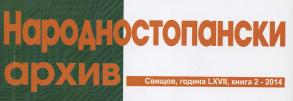-
Радко Радков, Андрей Захариев
Валутният борд в България: теоретически разсъждения и емпирични резултати
Резюме:
Чрез настоящата статия авторите си поставят за цел да развият гледната точка за пресечната между теоретическите виждания за валутния борд и отчитаните от България емпирични резултати. За постигането на дефинираната цел статията е структурирана в следните обособени части: първо, изясняване същността на валутния борд в светлината на водещите теоретични изследвания по проблема; второ, критичен анализ и оценка на особеностите на валутния борд в България; трето, обосновка на авторовия отговор на фундаменталния въпрос за финала на режима на валутен борд в България и замяната му с друга система; четвърто, иконометричен анализ и оценка на въздействието на външния сектор на икономиката върху БВП на България в условия на фиксиран валутен курс и високо отношения на външнотърговския обмен на стоки и услуги спрямо БВП; пето, изследване на въздействието на валутния борд върху икономическата конвергенция на България спрямо водещите икономики на ЕС за периода 1998-2012 г. За авторите пътят на България към членство в еврозоната, при запазване на режима на валутен борд за целия период на пребиваване в „чакалнята” на ERM II, е логичен и има своята обществена и институционална подкрепа. Аргументира се, че позитивният пример на Естония за влизане в еврозоната при запазване на валутния курс от нивото на валутния борд, е разумният и рационален национален проект за бъдещо развитие на националната икономика и нейната финансова система.
-
Бойко Петев
ДАНЪЧНИТЕ ИЗМАМИ – ЗАПЛАХА ЗА СИГУРНОСТТА
Резюме:
Предизвикателствата пред държавите – членки на ЕС в областта на данъчното облагане и данъчните измами са актуална тема. Обуславя се от няколко групи обстоятелства: промени в обществените отношения; нова правна уредба в Република България с оглед на нейното членство в ЕС; липсата на цялостни изследвания в съвременната доктрина по предмета на статията. Всичко това са аргументи да бъде извършено такова изследване, което се предопределя от изцяло новите за българското право и финансово-правната доктрина отношения, които налагат след повече от десет години членство в ЕС да бъдат направени анализи на натрупания опит и научените уроци, включително обществените отношения, възникващи, развиващи се в съвременната финансовата система на Република България и заплахата за сигурността, която е и част от финансовата система на ЕС. В някои аспекти е направен опит да бъдат представени и осмислени по нов начин.
-
Хорациу Дан
ПРИСЪЕДИНЯВАНЕТО
КЪМ ЕВРОЗОНАТА – ИЗСЛЕДВАНЕ НА РЕАЛНАТА И СТРУКТУРНАТА КОНВЕРГЕНЦИЯ В РУМЪНИЯ, БЪЛГАРИЯ И ХЪРВАТИЯ
Резюме:
Двадесет години след създаването на еврозоната валутният съюз остава предмет на академичен и политически дебат, който често се фокусира върху държави, които не са членки на ЕС, и върху техните аспирации (или липсата на такива) за валутна интеграция. В този контекст една от многото пречки за въвеждане на еврото като официална валута в тези страни е неяснотата на задължителните условия в Договора от Маастрихт, които, въпреки че са единственият набор от изисквания за конвергенция в европейското законодателство, се въз¬приемат от всички като недостатъчни за приемане в еврозоната. Това налага, тези първоначални условия за конвергенция да бъдат допълвани с по-непрозрачни условия за реална и структурна конвергенция. Целта на тази разработка е да се анализират някои показатели, свързани с реалната и структурната конвергенция в Румъния, България и Хърватия с оглед на ключовите аспекти по отношение на (1) възможностите им да достигнат изчисления спрямо СПС в ЕС среден БВП на глава от населението, (2) тяхната специализация, (3) синхронизацията на икономическата цикличност в тези страни и (4) структура на текущата сметка на платежния им баланс. Въпреки че тези четири показателя не са достатъчни за осигуряване на приемане в еврозоната, тяхното възприемане като предпоставки за възприемане на еврото като национална валута ще има положителен ефект върху ефективността на този процес.
-
Вениамин Тодоров
СТАБИЛИЗАЦИОННА РОЛЯ НА МАКРОИКОНОМИЧЕСКАТА ПОЛИТИКА ПО ВРЕМЕ НА COVID-19 КРИЗАТА
Резюме:
Изследването се фокусира върху стабилизационната макроикономическа политика, анализирайки ролята й по време на икономическа криза, предизвикана от COVID-19 пандемията. Внимание се обръща както на паричната, така и на фискалната политика. Използват се данни за макроикономическата активност, инфлацията, строгостта на ограничителните мерки, равнището на несигурността, степента на финансов стрес за финансовата система и др. Проверяват се две хипотези, формулирани по следния начин. Първата заявява, че с оглед на особеностите на COVID-19 екзогенния шок беше налице необходимост от бърза и решителна реакция чрез стабилизационната макроикономическа политика. Втората хипотеза твърди, че експанзионистичната макроикономическа политика е изиграла ключова роля за излизането от COVID-19 рецесията и преминаването към процес на възстановяване на икономиките. И двете хипотези се потвърждават.
